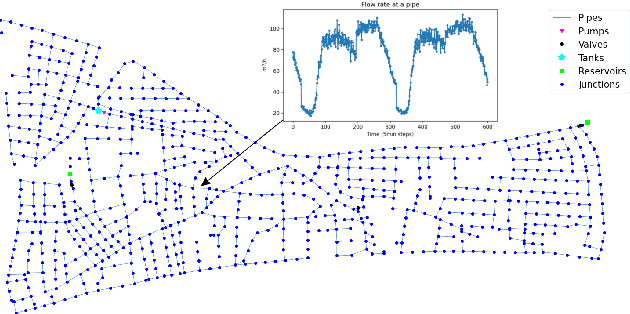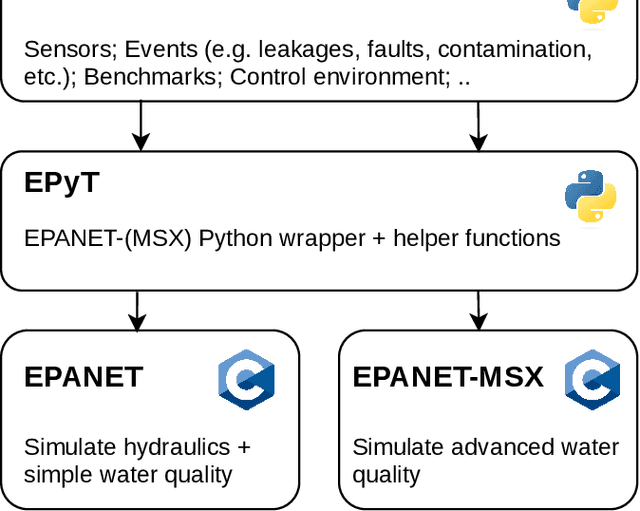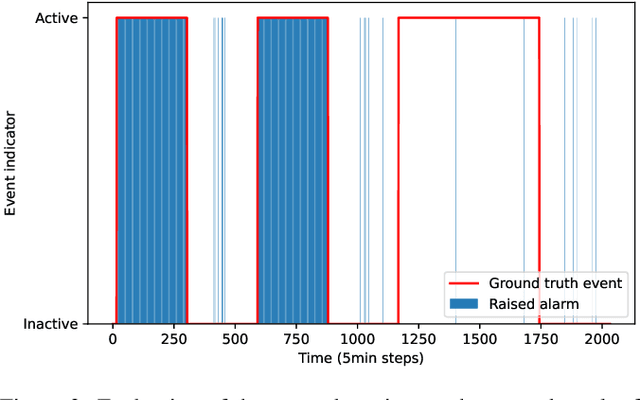Stelios G. Vrachimis
Interpretable Event Diagnosis in Water Distribution Networks
May 12, 2025Abstract:The increasing penetration of information and communication technologies in the design, monitoring, and control of water systems enables the use of algorithms for detecting and identifying unanticipated events (such as leakages or water contamination) using sensor measurements. However, data-driven methodologies do not always give accurate results and are often not trusted by operators, who may prefer to use their engineering judgment and experience to deal with such events. In this work, we propose a framework for interpretable event diagnosis -- an approach that assists the operators in associating the results of algorithmic event diagnosis methodologies with their own intuition and experience. This is achieved by providing contrasting (i.e., counterfactual) explanations of the results provided by fault diagnosis algorithms; their aim is to improve the understanding of the algorithm's inner workings by the operators, thus enabling them to take a more informed decision by combining the results with their personal experiences. Specifically, we propose counterfactual event fingerprints, a representation of the difference between the current event diagnosis and the closest alternative explanation, which can be presented in a graphical way. The proposed methodology is applied and evaluated on a realistic use case using the L-Town benchmark.
Online Detection of Water Contamination Under Concept Drift
Jan 03, 2025



Abstract:Water Distribution Networks (WDNs) are vital infrastructures, and contamination poses serious public health risks. Harmful substances can interact with disinfectants like chlorine, making chlorine monitoring essential for detecting contaminants. However, chlorine sensors often become unreliable and require frequent calibration. This study introduces the Dual-Threshold Anomaly and Drift Detection (AD&DD) method, an unsupervised approach combining a dual-threshold drift detection mechanism with an LSTM-based Variational Autoencoder(LSTM-VAE) for real-time contamination detection. Tested on two realistic WDNs, AD&DD effectively identifies anomalies with sensor offsets as concept drift, and outperforms other methods. A proposed decentralized architecture enables accurate contamination detection and localization by deploying AD&DD on selected nodes.
Urban Water Consumption Forecasting Using Deep Learning and Correlated District Metered Areas
Dec 30, 2024



Abstract:Accurate water consumption forecasting is a crucial tool for water utilities and policymakers, as it helps ensure a reliable supply, optimize operations, and support infrastructure planning. Urban Water Distribution Networks (WDNs) are divided into District Metered Areas (DMAs), where water flow is monitored to efficiently manage resources. This work focuses on short-term forecasting of DMA consumption using deep learning and aims to address two key challenging issues. First, forecasting based solely on a DMA's historical data may lack broader context and provide limited insights. Second, DMAs may experience sensor malfunctions providing incorrect data, or some DMAs may not be monitored at all due to computational costs, complicating accurate forecasting. We propose a novel method that first identifies DMAs with correlated consumption patterns and then uses these patterns, along with the DMA's local data, as input to a deep learning model for forecasting. In a real-world study with data from five DMAs, we show that: i) the deep learning model outperforms a classical statistical model; ii) accurate forecasting can be carried out using only correlated DMAs' consumption patterns; and iii) even when a DMA's local data is available, including correlated DMAs' data improves accuracy.
A Toolbox for Supporting Research on AI in Water Distribution Networks
Jun 04, 2024


Abstract:Drinking water is a vital resource for humanity, and thus, Water Distribution Networks (WDNs) are considered critical infrastructures in modern societies. The operation of WDNs is subject to diverse challenges such as water leakages and contamination, cyber/physical attacks, high energy consumption during pump operation, etc. With model-based methods reaching their limits due to various uncertainty sources, AI methods offer promising solutions to those challenges. In this work, we introduce a Python toolbox for complex scenario modeling \& generation such that AI researchers can easily access challenging problems from the drinking water domain. Besides providing a high-level interface for the easy generation of hydraulic and water quality scenario data, it also provides easy access to popular event detection benchmarks and an environment for developing control algorithms.
A Multi-label Time Series Classification Approach for Non-intrusive Water End-Use Monitoring
Sep 30, 2022Abstract:Numerous real-world problems from a diverse set of application areas exist that exhibit temporal dependencies. We focus on a specific type of time series classification which we refer to as aggregated time series classification. We consider an aggregated sequence of a multi-variate time series, and propose a methodology to make predictions based solely on the aggregated information. As a case study, we apply our methodology to the challenging problem of household water end-use dissagregation when using non-intrusive water monitoring. Our methodology does not require a-priori identification of events, and to our knowledge, it is considered for the first time. We conduct an extensive experimental study using a residential water-use simulator, involving different machine learning classifiers, multi-label classification methods, and successfully demonstrate the effectiveness of our methodology.
 Add to Chrome
Add to Chrome Add to Firefox
Add to Firefox Add to Edge
Add to Edge